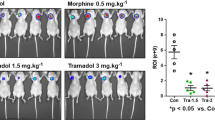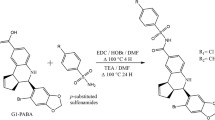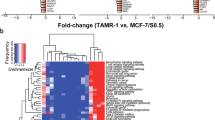Abstract
Aim:
To investigate the anticancer mechanisms of triptolide, a diterpenoid isolated from the plant Tripterygium wilfordii Hook F, against human breast cancer cells and the involvement of the estrogen receptor-α (ERα)-mediated signaling pathway in particular.
Methods:
Human breast cancer ERα-positive MCF-7 cells and ERα-negative MDA-MB-231 cells were tested. PrestoBlue assay was used to evaluate the cell viability. The levels of ERα mRNA and protein were detected with real-time PCR and immunoblotting, respectively. Mouse models of MCF-7 or MDA-MB-231 xenograft tumors were treated with triptolide (0.4 mg·kg−1·d−1, po) or a selective estrogen receptor modulator tamoxifen (mg·kg−1·d−1, po) for 3 weeks, and the tumor weight and volume were measured.
Results:
Triptolide (5–200 nmol/L) dose-dependently inhibited the viability of both MCF-7 and MDA-MB-231 cells, with a more potent inhibition on MCF-7 cells. Knockdown of ERα in MCF-7 cells by siRNA significantly attenuated the cytotoxicity of triptolide, whereas overexpression of ERα in MDA-MB-231 cells markedly enhanced the cytotoxicity. Triptolide dose-dependently decreased the expression of ERα in MCF-7 cells and MCF-7 xenograft tumors. Furthermore, treatment of MCF-7 cells with triptolide inhibited the phosphorylation of ERK1/2 in dose- and time-dependent manners. In the mice xenografted with MCF-7 cells, treatment with triptolide or tamoxifen resulted in significant reduction in the tumor weight and volume. Similar effects were not obtained in the mice xenografted with MDA-MB-231 cells.
Conclusion:
The anticancer activity of triptolide against ERα-positive human breast cancer is partially mediated by downregulation of the ERα-mediated signaling pathway.
Similar content being viewed by others
Log in or create a free account to read this content
Gain free access to this article, as well as selected content from this journal and more on nature.com
or
References
Yamashita H . Current research topics in endocrine therapy for breast cancer. Int J Clin Oncol 2008; 13: 380–3.
Nilsson S, Makela S, Treuter E, Tujague M, Thomsen J, Andersson G, et al. Mechanisms of estrogen action. Physiol Rev 2001; 81: 1535–65.
Bjornstrom L, Sjoberg M . Mechanisms of estrogen receptor signaling: convergence of genomic and nongenomic actions on target genes. Mol Endocrinol 2005; 19: 833–42.
Musgrove EA, Sutherland RL . Biological determinants of endocrine resistance in breast cancer. Nat Rev Cancer 2009; 9: 631–43.
Clemons M, Danson S, Howell A . Tamoxifen ("Nolvadex"): a review. Cancer Treat Rev 2002; 28: 165–80.
Osborne CK, Schiff R . Mechanisms of endocrine resistance in breast cancer. Annu Rev Med 2011; 62: 233–47.
Seddighzadeh M, Zhou JN, Kronenwett U, Shoshan MC, Auer G, Sten-Linder M, et al. ERK signalling in metastatic human MDA-MB-231 breast carcinoma cells is adapted to obtain high urokinase expression and rapid cell proliferation. Clin Exp Metastasis 1999; 17: 649–54.
Sun L, Li H, Huang X, Wang T, Zhang S, Yang J, et al. Triptolide alters barrier function in renal proximal tubular cells in rats. Toxicol Lett 2013; 223: 96–102.
Sun L, Zhang S, Jiang Z, Huang X, Wang T, Li H, et al. Triptolide inhibits COX-2 expression by regulating mRNA stability in TNF-alpha-treated A549 cells. Biochem Biophys Res Commun 2011; 416: 99–105.
Xue M, Jiang ZZ, Liu JP, Zhang LY, Wang T, Wang H, et al. Comparative study on the anti-inflammatory and immune suppressive effect of Wilforlide A. Fitoterapia 2010; 81: 1109–12.
Li J, Zhu W, Leng T, Shu M, Huang Y, Xu D, et al. Triptolide-induced cell cycle arrest and apoptosis in human renal cell carcinoma cells. Oncol Rep 2011; 25: 979–87.
Liu J, Jiang ZZ, Xiao JW, Zhang Y, Lin SS, Duan WG, et al. Effects of triptolide on ERα and p53 expression in two human breast cancer cell lines. Phytomedicine 2009; 16: 1006–13.
Maurisse R, De Semir D, Emamekhoo H, Bedayat B, Abdolmohammadi A, Parsi H, et al. Comparative transfection of DNA into primary and transformed mammalian cells from different lineages. BMC Biotechnol 2010; 10: 9.
Nizamutdinova IT, Lee GW, Son KH, Jeon SJ, Kang SS, Kim YS, et al. Tanshinone I effectively induces apoptosis in estrogen receptor-positive (MCF-7) and estrogen receptor-negative (MDA-MB-231) breast cancer cells. Int J Oncol 2008; 33: 485–91.
Massarweh S, Schiff R . Unraveling the mechanisms of endocrine resistance in breast cancer: new therapeutic opportunities. Clin Cancer Res 2007; 13: 1950–4.
Osborne CK, Schiff R . Estrogen-receptor biology: continuing progress and therapeutic implications. J Clin Oncol 2005; 23: 1616–22.
Sivaraman VS, Wang H, Nuovo GJ, Malbon CC . Hyperexpression of mitogen-activated protein kinase in human breast cancer. J Clin Invest 1997; 99: 1478–83.
Ali S, Coombes RC . Endocrine-responsive breast cancer and strategies for combating resistance. Nat Rev Cancer 2002; 2: 101–12.
Chen D, Riedl T, Washbrook E, Pace PE, Coombes RC, Egly JM, et al. Activation of estrogen receptor alpha by S118 phosphorylation involves a ligand-dependent interaction with TFIIH and participation of CDK7. Mol Cell 2000; 6: 127–37.
Jeng MH, Yue W, Eischeid A, Wang JP, Santen RJ . Role of MAP kinase in the enhanced cell proliferation of long term estrogen deprived human breast cancer cells. Breast Cancer Res Treat 2000; 62: 167–75.
Martin LA, Farmer I, Johnston SR, Ali S, Marshall C, Dowsett M . Enhanced estrogen receptor (ER) alpha, ERBB2, and MAPK signal transduction pathways operate during the adaptation of MCF-7 cells to long term estrogen deprivation. J Biol Chem 2003; 278: 30458–68.
Johnston SR, Leary A, Martin LA, Smith IE, Dowsett M . Enhancing endocrine response with novel targeted therapies: why have the clinical trials to date failed to deliver on the preclinical promise? Cancer 2008; 112: 710–7.
Owa C, Michael E, Messina J, Reginald H . Triptolide induces lysosomal-mediated programmed cell death in MCF-7 breast cancer cells. Int J Womens health 2013; 5: 557–69.
Tan BJ, Tan BH, Chiu GNC . Effect of triptolide on focal adhesion kinase and survival in MCF-7 breast cancer cells. Oncol Rep 2011; 26: 1315.
Hongmin S, Jinghua M, Tianhua G, Rongrong H . Triptolide induces apoptosis of breast cancer cells via a mechanism associated with the Wnt/β catenin signaling pathway. Exp Ther Med 2014; 8: 505–8.
Semenov DV, Aronov PA, Kuligina EV, Potapenko MO, Richter VA . Oligonucleosome DNA Fragmentation of caspase 3 deficient MCF-7 cells in palmitate-induced apoptosis. Nucleosides Nucleotides Nucleic Acids 2004; 23: 831–6.
Acknowledgements
This work was supported by grants from the National Natural Science Foundation of China (No 81001564, 81102887, 81274146, and 81320108029), the Natural Science Foundation of Jiangsu Province (No BK 2010433) and Beijing Nova Program (No Z141107001814061).
Author information
Authors and Affiliations
Corresponding authors
Rights and permissions
About this article
Cite this article
Li, H., Pan, Gf., Jiang, Zz. et al. Triptolide inhibits human breast cancer MCF-7 cell growth via downregulation of the ERα-mediated signaling pathway. Acta Pharmacol Sin 36, 606–613 (2015). https://doi.org/10.1038/aps.2014.162
Received:
Accepted:
Published:
Issue date:
DOI: https://doi.org/10.1038/aps.2014.162
Keywords
This article is cited by
-
l-Carnitine reduces reactive oxygen species/endoplasmic reticulum stress and maintains mitochondrial function during autophagy-mediated cell apoptosis in perfluorooctanesulfonate-treated renal tubular cells
Scientific Reports (2022)
-
Naturally occurring anti-cancer compounds: shining from Chinese herbal medicine
Chinese Medicine (2019)
-
A Novel Immunocompetent Mouse Model of Pancreatic Cancer with Robust Stroma: a Valuable Tool for Preclinical Evaluation of New Therapies
Journal of Gastrointestinal Surgery (2016)



